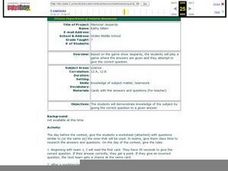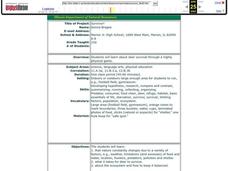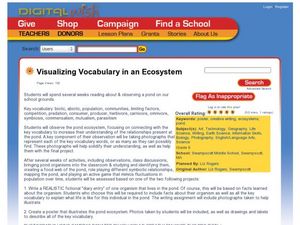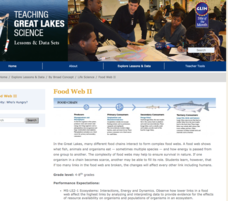Virginia Department of Education
The Law of Conservation of Matter
The Law of Conservation of Matter can be complex for young scientists to fully grasp. Use this experiment to help simplify the process as pupils perform two experiments to determine mass: one that melts a substance and the other that...
Virginia Department of Education
States and Forms of Energy
Energy is just energy, right? Explain various forms of energy to your young scientists by using an interactive experiment that contains common objects to demonstrate complex concepts. Pupils conduct experiments for radiant, thermal,...
Curated OER
Mammal Jeopardy
Seventh graders play a jeopardy like game using information about mammals. Before beginning the game, they complete a worksheet with questions similar to ones that are to be used during the competition. They answer more difficult...
Curated OER
Survivor!
Students play a game in physical education class to examine how a deer survives. Using nature as a guide, they discover how it is constantly changing due to weather, food, water, pollution and predators. They discuss the characteristics...
Community Resources for Science
A Whole New World of DNA and Proteins
Lead your young scientists into an exciting world as they participate in a role play and experiment focused on proteins and DNA. After researching the Central Dogma of Biology, individuals or groups participate in a classroom...
Curated OER
Visualizing Vocabulary in an Ecosystem
Sixth graders observe the pond ecosystem. In this ecosystem lesson, 6th graders observe the organisms at the pond and create a poster that illustrates the pond.
Curated OER
Applied Science -Physics (4A) Post Lab
Fourth graders explore the history of electricity. For this electricity lesson, 4th graders review the connection between electricity and magnetism. They do a research project on the history of electricity.
Montana State University
Everest Extremes: Biodiversity
How many animals can live in a climate as cold as Mount Everest's? Find out with a science lesson all about biodiversity. Activities include research, presentations, group work, coloring maps, and a simulation of a food web.
Curated OER
Properties of Liquids
Pupils describe properties of liquids and use descriptive language as a springboard to develop precise vocabulary for properties of liquids. They also use vocabulary as practiced with liquid-vocabulary card games. Finally, students...
Curated OER
Reduce, Reuse, Recycle and Respect
Second graders study the vocabulary that is associated with recycling and tell what recycling is. In this recycling lesson, 2nd graders use flash cards and Concentration type games to learn the vocabulary associated with recycling. They...
Curated OER
Geographically Speaking
Students play a matching game to reinforce the retention of vocabulary words. In this geography lesson, students watch a PowerPoint to define vocabulary words associated with geography, play a memory game with the words, and write...
Curated OER
Mantle Motions
Young scholars define vocabulary words associated with lithospheric plate motions. They create and write down a motion to act out each vocabulary word, and participate in a game of demonstrating the actions associated with each word.
Curated OER
Maggie's Adventures Grades 1-2
Learners use Maggie's Learning Adventures online activity. They play a matching or memory game to become aware of homophones. Students recognize that there two ways to use many words. They practice with noun or verb identification by...
Curated OER
Go Bug!
Second graders explore the lives of insects by participating in a card game. In this metamorphosis lesson, 2nd graders define several scientific vocabulary terms associated with insects and identify the different life cycles associated...
California Academy of Science
Sustainable Fishing in the Philippines
Understanding the importance of sustainable fishing practices is fostered through a classroom game. In small groups, the class plays a fishing game where they can see first-hand, the effects of thoughtless fishing practices. After the...
Curated OER
Weather in a Bottle
Fifth graders examine air flow, pressure, condensation and examine how to read a weather map. In this informative lesson students learn vocabulary then see how these terms can be applied by viewing a few demonstrations pertaining...
Curated OER
Illinois Biodiversity
Students examine the amount of biodiversity in the state of Illinois. They practice using new vocabulary and listening to stories about animals. After given time to reflect, they write their own haiku. They work together to create a...
California Academy of Science
Where Do I Put My Trash?
Where does the trash go after you put it in the garbage can? The class discusses sustainability, recycling, compost, and landfills as they play as fun relay game. In teams, they race to be the fastest group to successfully sort...
Curated OER
Fun With Food Chains
Students explore our ecosystem by researching animal eating habits. In this food chain lesson, students identify the links between predator and prey and the energy that passes between organisms based on what their diet consists of....
Curated OER
Forest Food Chains and Webs
Students explore forest ecological systems. In this ecology lesson, students classify forest plants and animals according to their ecological roles. Students play a related vocabulary guessing game. Students choose a card on which...
Curated OER
Urban Life: What Lives In Our Local Park?
Fifth graders participate in activities during a visit to Central Park. In this urban life lesson plan, 5th graders visit Central Park where they explore pond dipping, stream chemistry, and play a native plant Bingo game.
Curated OER
Food Chain: what's for dinner?
Fourth graders identify where foods came from and sequence a food chain. In this food chain lesson, 4th graders define vocabulary related to food chains and order a food chain. Students follow the energy of a food chain. Students...
Curated OER
Animals and Plants of BC's Rocky Shore: lesson 3
Young scholars create a mural of the food chain of the animals and plants of BC's rocky shore. In this food chain lesson plan, students also play a food chain matching game.
Michigan Sea Grant
Food Web II
A food web consists of complex food chains and the more complex the web, the better likelihood of survival. Learners compare and contrast food webs and food chains and discuss concepts like the predator-prey and consumer-producer...























